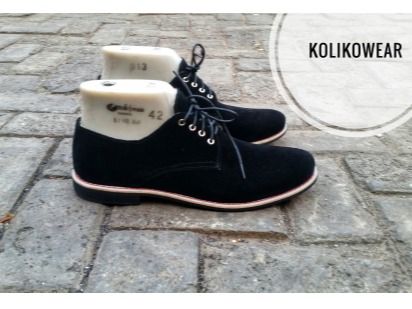
Added: Feb 15, 2021
Last edited: Apr 23, 2021
Koliko produces hand-made shoes from repurposed materials such as second-hand jeans, offcuts of fabric, flour sacks and waste car tyres.
Ghana is Africa’s number one recipient of second-hand or unsold clothing from Europe. About 50% of these clothing items end up in landfill almost as soon as they are imported, while many others are burnt. Manufacturers are obliged to make more to respond to evolving fashion trends, causing a significant carbon footprint, the creation of ever more waste, and more dumping in secondary markets such as Ghana. With this surplus, however, there is an opportunity to convert discarded materials into other fashion items of higher value at a lower cost
Kolics produces hand-made shoes from repurposed materials. They sell their shoes under the brand name Koliko Wear. Koliko Wear shoes, for example, are made with materials such as second-hand jeans, pieces of excess fabric from local seamstresses, flour sacks from bakeries and waste car tyres. They also upcycle used footwear into new designs. Because of their approach to the supply chain, it is sometimes hard to match customer demands, but equally customers love that each pair of shoes is distinct. The Kolics team is also passionate about training. They run an informal internship programme for fashion students from the local technical university in their community. The company recently participated in the Zongo Development Project, which was started by the Ghanaian government to support young people with technical skills. Kolics play san advocacy role to educate the public on proper clothing disposal through radio features and they run a scheme to accept old clothes from community members for use in their production. Kolics also participated in the Ghana Climate Innovation Centre’s Climate Launchpad in 2019.
This case study has been created as part of Footprints Africa's work to build the first ever comprehensive mapping of circular economy initiatives in Africa. This will lay the foundation open-source database that can inspire local initiatives, as well as inform the global dialogue, which is largely focused on the European and American contexts. We are doing this in collaboration with the African Circular Economy Network (ACEN). ACEN's vision is to build a restorative African economy that generates well-being and prosperity inclusive of all its people through new forms of economic production and consumption which maintain and regenerate its environmental resources.
The objective is to build an open-source database featuring 500 cases by the end of 2021, with strong regional representation. These will feature in the Knowledge Hub and are also being mapped by GRID-Arendal.




Stretch the lifetime
Use waste as a resource
Maximise lifetime of products after use
Education and Curriculum
Africa
Circular Economy
fashion and textiles
ghana
Footprints Africa
Waste as a resource
